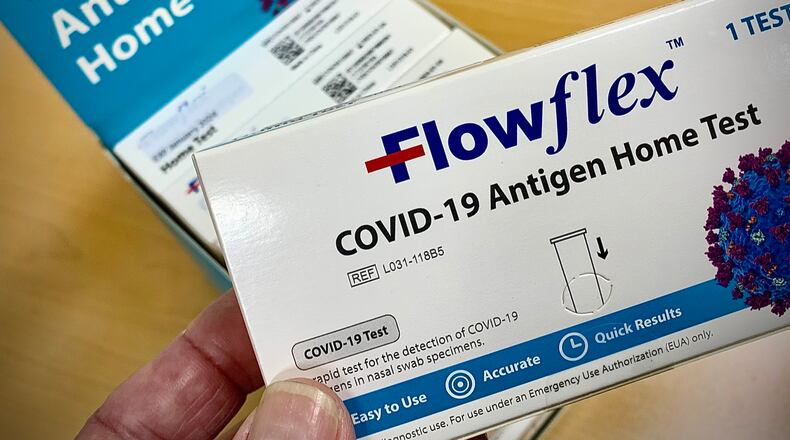Ohio’s case numbers for COVID-19 declined in the fall after a late summer increase, but Vanderhoff cautioned people against getting complacent when it comes to taking precautions.
“An average of 20 Ohioans still die of COVID-19 each week. More than 1,100 Ohioans have died of COVID-19 this year,” he said.
Nearly 7,000 Ohioans have been hospitalized this year with COVID-19, he said.
“Even as the virus continues to evolve, we need to remember that it can still cause severe illness and death,” Vanderhoff said.
Staying up to date on vaccinations, staying home when sick and practicing common hygiene habits like washing hands and covering your mouth when you cough are some of the ways to reduce the spread of respiratory illnesses.
For large gatherings, hosts can make sure there is proper ventilation where the gathering is being held.
“If it’s possible to crack a window or do something to improve air circulation, that can be very helpful,” Vanderhoff said.
There were 119 hospitalizations related to COVID-19 reported statewide in the most recent week of data, according to the Ohio Department of Health. That is up from the three-week average of 91 hospitalizations per week.
There were also seven ICU admissions in the most recent week of data, up from the average of five, along with 18 reported deaths, down from the three-week average of 20.
In December so far, there were four hospitalizations related to COVID-19 reported in Montgomery County, along with three in Greene County and one each in Warren and Butler counties.
Last month, there were 39 hospitalizations reported in Montgomery County, along with 12 in Greene County, 10 in Butler County, eight in Miami County and two in Warren County.
These numbers are much lower than the worst periods of the COVID pandemic in 2020-22, when Ohio had some weeks-long stretches with more than 100 deaths per day. Since 2020, more than 44,000 Ohioans have died from COVID, according to ODH. That’s roughly equivalent to the entire population of Huber Heights.
“The CDC recommends that everyone six months or older receive an updated 2024-2025 COVID shot to protect against severe disease this fall and winter,” Vanderhoff said. “This is particularly important for those who are 65 and older or who are immunocompromised or have certain chronic medical conditions.”
In October, the CDC recommended people 65 years and older and those who are moderately or severely immunocompromised can receive a second dose of 2024-2025 COVID-19 vaccine six months after their first dose.
“CDC will continue to educate the public on how and when to get their updated vaccinations so they can risk less severe illness and do more of what they love,” said CDC director Dr. Mandy Cohen.
These updated recommendations also allow for flexibility for additional doses, such as three or more, for those who are moderately or severely immunocompromised, in consultation with their health care provider, the CDC said.
“The older Ohio population is actually doing a pretty good job of getting the updated vaccine, which is encouraging,” Vanderhoff said. “We’re seeing numbers that could be higher, but are every bit as good as what we saw in the previous year.”
Nearly 1.1 million Ohioans, or 9.03% of the state population, have gotten the updated COVID-19 vaccine, according to the Ohio Department of Health. There were 29,406 people who got the vaccine in most recent week of data.
Influenza is off to a slow start this season. The flu activity in the state is currently low, according to the Ohio Department of Health, which reported 21 hospitalizations related to the flu so far this season.
During the 2023-2024 flu season, illnesses peaked in February 2024, which is similar to the 2019-2020 flu season, according to Ohio Department of Health data. The 2022-2023 flu season saw a large peak in December 2022.
Vaccines are readily available through health care providers and at many pharmacies. Visit Vaccines.gov to find a pharmacy near you.
Credit: Nick Graham
Credit: Nick Graham
About the Author


